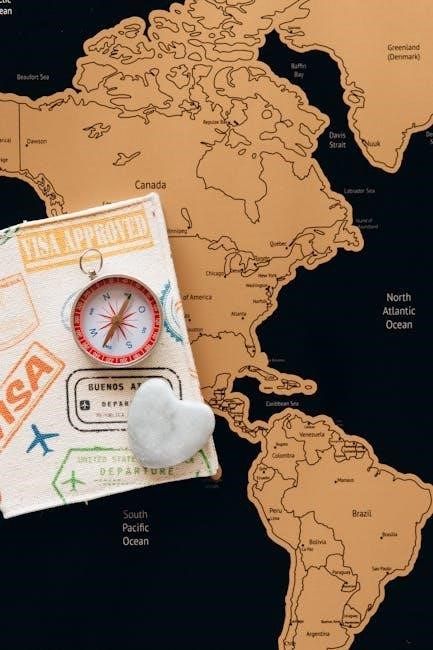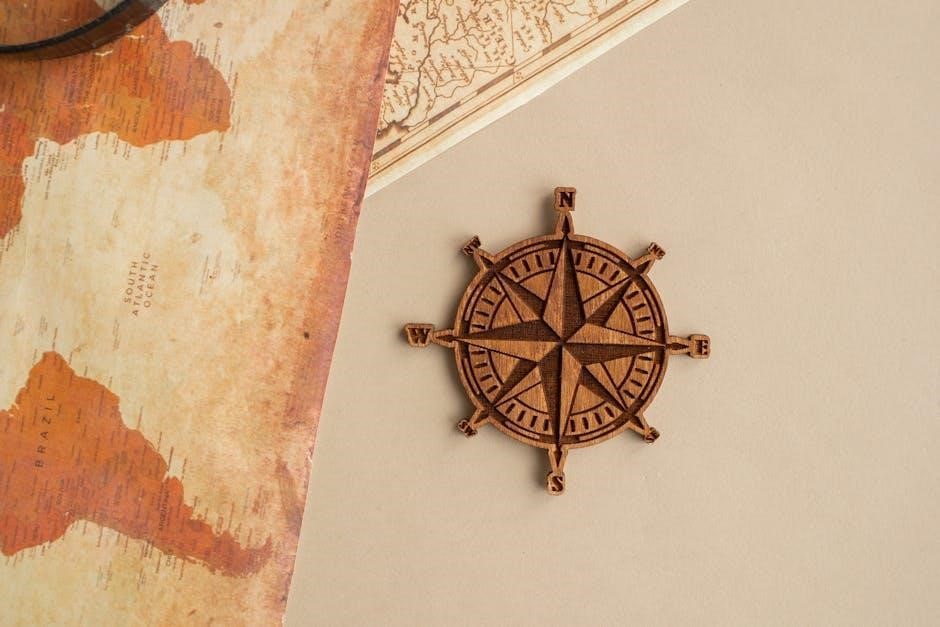Prepping is a proactive approach to emergency preparedness‚ focusing on self-reliance and resilience. It involves planning‚ stockpiling supplies‚ and developing strategies to survive crises.
What is Prepping?
Prepping is a proactive lifestyle focused on preparing for emergencies‚ natural disasters‚ or unforeseen events. It involves creating strategies and stockpiling essential supplies to ensure survival and comfort during crises. Preppers aim to be self-reliant‚ often storing food‚ water‚ medical supplies‚ and tools. The goal is to maintain stability and safety until help arrives or conditions improve. Prepping can range from basic emergency kits to advanced plans for long-term sustainability. It encourages individuals to anticipate risks and take practical steps to mitigate them. By being prepared‚ preppers seek to protect themselves‚ their families‚ and communities from potential hardships. This mindset emphasizes readiness‚ resilience‚ and the ability to adapt to challenging situations.
Why is Prepping Important?
Prepping is essential for ensuring safety and well-being during unpredictable events like natural disasters‚ economic crises‚ or personal emergencies. By being prepared‚ individuals can reduce vulnerability and maintain stability. It fosters self-reliance‚ empowering people to take control of their lives. Prepping also promotes peace of mind‚ knowing that essential supplies and plans are in place. In a world filled with uncertainties‚ prepping is a proactive approach to safeguarding health‚ security‚ and resources. It’s not just about surviving but thriving through challenges. Whether it’s a 72-hour emergency kit or long-term food storage‚ prepping ensures resilience and adaptability in the face of adversity. It’s a responsible and practical lifestyle choice for anyone seeking to protect themselves and their loved ones.
Who Should Consider Prepping?
Prepping is essential for anyone seeking self-reliance and resilience‚ particularly those in disaster-prone areas or with dependents. Families‚ outdoor enthusiasts‚ and individuals concerned about economic instability benefit greatly. It’s also ideal for those who value independence and want to ensure safety during unexpected events. Prepping isn’t limited to extreme scenarios; it’s a practical lifestyle choice for anyone wanting to be prepared. By incorporating AI tools‚ such as those mentioned earlier‚ preppers can enhance their strategies‚ whether it’s calculating food rationing or optimizing search efforts. This proactive approach ensures readiness for various challenges‚ making it a versatile solution for diverse needs and lifestyles.

Foundations of Preparedness
Preparedness begins with essential supplies like food‚ water‚ and first aid kits. Planning and organizing these resources ensures readiness for unexpected emergencies and challenges.
Emergency Supplies Checklist
A well-prepared emergency supplies checklist ensures readiness for crises. Stockpile essentials like clean water (at least 1 gallon per person per day)‚ non-perishable food‚ and a first aid kit. Include flashlights‚ extra batteries‚ and a portable radio for communication. Add warm clothing‚ blankets‚ and sturdy shelter materials like a tent or tarp. Personal hygiene items‚ such as toothbrushes and hand sanitizer‚ are crucial. Tools like a multi-tool or knife‚ rope‚ and duct tape can aid in repairs. Don’t forget important documents (e.g.‚ ID‚ insurance) in a waterproof container. Consider dietary needs and pet supplies if applicable. Regularly update and replenish your stock to ensure everything remains usable and relevant.
Food and Water Storage Strategies
Effective food and water storage is critical for long-term survival. Stockpile non-perishable‚ high-calorie foods like dried grains‚ canned goods‚ and energy bars. Rotate supplies every 6-12 months to ensure freshness. Store food in airtight‚ moisture-proof containers to protect against pests and spoilage. For water‚ aim to store at least 1 gallon per person per day for drinking‚ cooking‚ and hygiene. Consider water purification methods‚ such as filters or tablets‚ for additional supplies. Label and organize storage areas for easy access. Incorporate nutrient-dense foods to maintain health‚ and plan for food preparation without electricity‚ such as using solar ovens or camping stoves. Regularly inspect stored items for expiration dates and damage to ensure reliability during emergencies.
First Aid and Medical Preparedness

First aid and medical preparedness are critical components of any prepping plan‚ ensuring you can address injuries and illnesses during emergencies. A well-stocked first aid kit is essential‚ including bandages‚ antiseptics‚ pain relievers‚ and medical gloves. Additionally‚ consider including prescription medications‚ medical tools like tweezers and scissors‚ and a first aid manual. Training in basic first aid techniques‚ such as wound cleaning‚ splinting‚ and CPR‚ is vital for effective response. For long-term sustainability‚ learn about herbal remedies and natural healing methods. Advanced preppers may also invest in portable defibrillators or surgical supplies for severe scenarios. Regularly update your medical supplies and practice your skills to stay prepared for crises.
Shelter and Safety Measures
Shelter and safety are critical components of prepping‚ ensuring protection from environmental hazards and potential threats. A well-prepared shelter should be structurally sound‚ with essentials like bedding‚ lighting‚ and ventilation. Consider alternative shelter options‚ such as tents or underground bunkers‚ for emergencies. Safety measures include securing entry points‚ installing alarm systems‚ and maintaining surveillance. Stockpile tools like fire extinguishers‚ sandbags‚ and reinforced materials to fortify your shelter. Plan escape routes and emergency exits‚ ensuring all family members are aware of them. Additionally‚ store self-defense tools and communication devices within reach. Regular drills can help maintain readiness and ensure everyone knows how to respond during a crisis. A secure shelter enhances survival chances and provides peace of mind.

Advanced Prepping Strategies
Advanced prepping involves integrating AI tools for optimized planning‚ communication‚ and resource management. AI can enhance decision-making‚ streamline tasks‚ and improve survival strategies in critical situations effectively.

Communication Devices for Emergencies
Reliable communication devices are essential for emergency preparedness‚ enabling connections during crises when traditional networks fail. Satellite phones are ideal for remote areas‚ offering connectivity independent of cell towers. Ham radios provide cost-effective‚ two-way communication for local coordination‚ while handheld radios like walkie-talkies are portable and easy to use. Solar-powered chargers and power banks ensure devices remain operational without electricity. Preppers often combine these tools with a communication plan‚ designating meeting points and protocols. Balancing advanced technology with simplicity ensures effectiveness in high-stress scenarios. Investing in these devices enhances safety and coordination‚ making them vital for any prepper’s toolkit.
Self-Defense and Security Planning
Self-defense and security planning are critical components of prepping‚ ensuring personal and family safety during crises. A well-rounded strategy includes training in self-defense techniques‚ firearm safety‚ and situational awareness.
A layered security approach‚ such as securing your home with alarms and reinforced doors‚ can deter intruders. Additionally‚ consider non-lethal options like pepper spray or stun guns for scenarios where lethal force is unnecessary.
Mental preparedness is equally important—stay alert‚ avoid confrontation‚ and know when to act. Building a community network for mutual support enhances security‚ as a collective effort can deter threats more effectively than individual actions.
Regular practice and updating your security plan ensure readiness for evolving risks. Remember‚ security is not just about weapons but also about mindset and strategy.
Alternative Energy Sources
Alternative energy sources are crucial for long-term sustainability in crisis situations. Solar panels‚ wind turbines‚ and hydro-powered systems provide reliable energy without reliance on the grid. Portable solar chargers are ideal for charging essential devices.
Biogas generators and fuel cells offer sustainable solutions for cooking and lighting. Energy storage systems‚ like deep-cycle batteries‚ ensure power availability during periods of low energy generation.
When selecting an energy source‚ consider location‚ budget‚ and specific needs. Regular maintenance and backups‚ such as generators‚ are vital for uninterrupted energy supply.
Investing in alternative energy ensures independence and resilience‚ making it a cornerstone of advanced prepping strategies.
Navigation and Orientation Techniques
Navigation is crucial in survival scenarios‚ especially when modern tools fail. Learn to use natural signs‚ such as the sun’s position‚ stars‚ and landmarks‚ to determine direction. A compass is essential‚ but understanding how to navigate without one is equally important. GPS devices can be reliable‚ but they may not work during emergencies‚ so mastering traditional methods is vital. Practice identifying constellations and understanding shadow alignment to stay oriented. Additionally‚ creating mental or physical maps of your surroundings can enhance your ability to navigate unfamiliar territories. These skills ensure you can move safely and efficiently‚ even in the most challenging conditions. Regular practice and knowledge of these techniques can be lifesaving in a crisis.

Mental and Physical Preparedness
Mental resilience is crucial for surviving crises‚ enabling calm decision-making and focus. Physical fitness enhances stamina and endurance‚ while mindfulness practices help manage stress and build confidence.
Mental Resilience in Crisis Situations
Mental resilience is crucial for navigating crisis situations effectively. It involves cultivating a strong mindset‚ emotional stability‚ and the ability to adapt under pressure. Techniques like mindfulness‚ positive thinking‚ and stress management can enhance resilience. Practicing these skills beforehand ensures better decision-making during emergencies. Additionally‚ understanding human psychology and behavioral patterns can help preppers anticipate and manage panic or conflict. Training the mind to remain calm and focused is as vital as stockpiling supplies. Building mental resilience also involves learning from past experiences and staying adaptable. A resilient mindset not only aids survival but also fosters hope and determination‚ essential for overcoming challenges.
Physical Fitness for Survival
Physical fitness is a cornerstone of survival preparedness‚ ensuring the ability to handle demanding situations. Regular exercise improves cardiovascular health‚ strength‚ and endurance‚ enabling individuals to carry supplies‚ navigate challenging terrain‚ and perform physically demanding tasks during emergencies. A well-rounded fitness plan should include strength training‚ cardio‚ and flexibility exercises. Practicing survival-specific skills‚ such as hiking with a heavy pack or swimming‚ can also enhance readiness. Mental resilience is closely linked to physical health‚ as a fit body supports a strong mind. Consistency is key; even moderate activity can significantly improve survival capabilities. Tailoring workouts to individual needs ensures sustainability and effectiveness. Staying physically prepared is vital for overcoming the physical challenges of crises.
Team Building and Community Support
Team building and community support are crucial for long-term survival and resilience. Building a strong‚ reliable team ensures shared responsibilities and diverse skill sets‚ enhancing overall preparedness. Trust‚ communication‚ and collaboration are essential for effective teamwork. Communities can organize group training sessions‚ such as first aid workshops or emergency drills‚ to strengthen bonds and improve readiness. Sharing resources and knowledge within a group reduces individual burdens and fosters mutual aid. Strong social networks also provide emotional support during crises‚ helping individuals stay resilient. Encouraging open dialogue and active participation ensures everyone contributes and feels valued. A united community can overcome challenges more effectively than isolated individuals‚ making teamwork a cornerstone of successful prepping strategies.

Technology and Tools
Technology plays a crucial role in modern prepping‚ with AI tools optimizing search and planning. Communication devices and alternative energy sources enhance survival capabilities.
AI and Search Optimization for Preppers
AI and search optimization are transforming how preppers gather and utilize information. By leveraging AI-driven tools like ChatGPT and Bing Copilot‚ preppers can enhance their search capabilities‚ ensuring they find the most relevant and accurate data quickly. Adapting content to focus on user intent rather than keywords improves visibility and accessibility. Fine-tuning AI models‚ such as LLaMA 3‚ on prepping-specific data enables personalized solutions‚ like calculating food rations for survival scenarios. This interactive approach not only streamlines planning but also aids in real-time decision-making during emergencies. As AI technology advances‚ its integration into prepping strategies becomes increasingly vital for effective preparedness and response.
Using AI Tools for Prepping Planning
AI tools are revolutionizing prepping by enhancing planning efficiency and accuracy. Interactive AI systems can guide users in crafting strategies‚ such as calculating food rations for survival scenarios. By adapting content to focus on user intent‚ AI-driven search engines like ChatGPT and Bing Copilot can provide tailored solutions. For instance‚ fine-tuned models like Llama3 can optimize resource allocation‚ ensuring precise calorie and nutrient distribution for individuals. AI also aids in mock interviews for crisis scenarios‚ offering feedback to improve preparedness. Tools like SearchGPT generate human-like text to assist in creating detailed plans. These technologies empower preppers to make informed decisions‚ streamlining the preparation process and ensuring readiness for emergencies. AI is becoming an indispensable asset for modern prepping strategies.
Adapting AI for Specific Prepping Tasks
AI can be tailored to enhance various prepping tasks‚ such as optimizing food rationing‚ predicting disaster scenarios‚ and providing interactive guidance during emergencies. By fine-tuning models like LLaMA on prepping data‚ AI can calculate precise calorie and nutrient needs for survival. Additionally‚ AI-driven tools can assist in search optimization‚ helping preppers find essential resources quickly. Communication during crises can be improved with AI-encoded messaging and navigation aids. AI also offers mental resilience support through apps designed to maintain calm and focus. These adaptations make AI a versatile ally in preparedness‚ ensuring preppers are better equipped to handle diverse challenges effectively.

Long-Term Sustainability
Long-term sustainability involves strategies for enduring crises‚ including resource management and renewable energy‚ ensuring resilience and self-reliance for extended periods.

Gardening and Food Production
Gardening and food production are essential for long-term sustainability in prepping. Growing your own food ensures a reliable source of nutrients during emergencies. Start by selecting crops that are easy to grow and nutrient-dense‚ such as vegetables‚ fruits‚ and legumes. Implement techniques like companion planting and crop rotation to maximize yields. Consider using greenhouses or cold frames to extend the growing season. Water conservation methods‚ like rainwater harvesting‚ are crucial for maintaining your garden. Additionally‚ learn about food preservation techniques‚ such as canning‚ dehydrating‚ and fermenting‚ to store your harvest for future use. For animal-based protein‚ consider raising small livestock or poultry. Finally‚ explore alternative food sources like foraging for wild edibles. These strategies ensure a sustainable food supply‚ enhancing your preparedness for any crisis.
Water Purification and Recycling
Water purification and recycling are critical for long-term survival‚ ensuring access to safe drinking water in emergencies. Methods like boiling‚ filtration‚ and chemical treatment can remove contaminants. Recyclingsystems‚ such as greywater reuse and condensation collection‚ conserve resources. These techniques are reliable and essential for preppers‚ providing sustainable solutions when supplies are scarce.
Waste Management in Survival Scenarios
Proper waste management is crucial in survival situations to prevent disease and maintain a clean environment. Start by designating a safe area for waste disposal‚ ensuring it’s far from water sources. Use trenches or shallow pits for human waste‚ covering it with soil to minimize odor and contamination. For trash‚ burn non-recyclable items in a controlled fire pit‚ reducing volume and eliminating pathogens; Recycle materials like metal and plastic for future use. Compost organic waste to create fertilizer for gardening‚ enhancing long-term sustainability. Always prioritize sanitation‚ using hand sanitizer and maintaining hygiene to avoid health risks. Effective waste management ensures resource conservation and reduces environmental impact during crises.
Prepping empowers individuals to face uncertainties with confidence. By leveraging AI tools for planning and optimization‚ preppers can enhance their strategies‚ ensuring resilience in any crisis. Start today.

Final Thoughts on Prepping
Prepping is a mindset rooted in resilience and foresight‚ empowering individuals to navigate life’s uncertainties with confidence. By combining practical strategies‚ mental fortitude‚ and community support‚ preppers build a foundation for survival and sustainability. The integration of advanced tools‚ such as AI‚ offers innovative solutions for planning and resource management. Whether it’s optimizing food rationing or enhancing communication‚ AI-driven approaches can significantly enhance preparedness. Ultimately‚ prepping is not just about survival; it’s about thriving in the face of adversity. Embrace the journey‚ stay adaptable‚ and remember that preparedness is a lifelong commitment to safety and self-reliance.
Encouragement to Start Prepping
Prepping is a empowering step toward self-reliance and peace of mind. It’s not about paranoia but about being proactive for unexpected challenges. Start small—stockpile essentials‚ learn basic survival skills‚ and gradually build your readiness. Remember‚ preparedness is for everyone‚ regardless of background or resources. Each step you take strengthens your ability to protect yourself and loved ones. Don’t wait until it’s too late; take control today and embrace the mindset of resilience. With modern tools like AI and online guides‚ prepping has never been more accessible. Begin your journey now and feel the confidence that comes with being prepared for whatever life throws your way.

